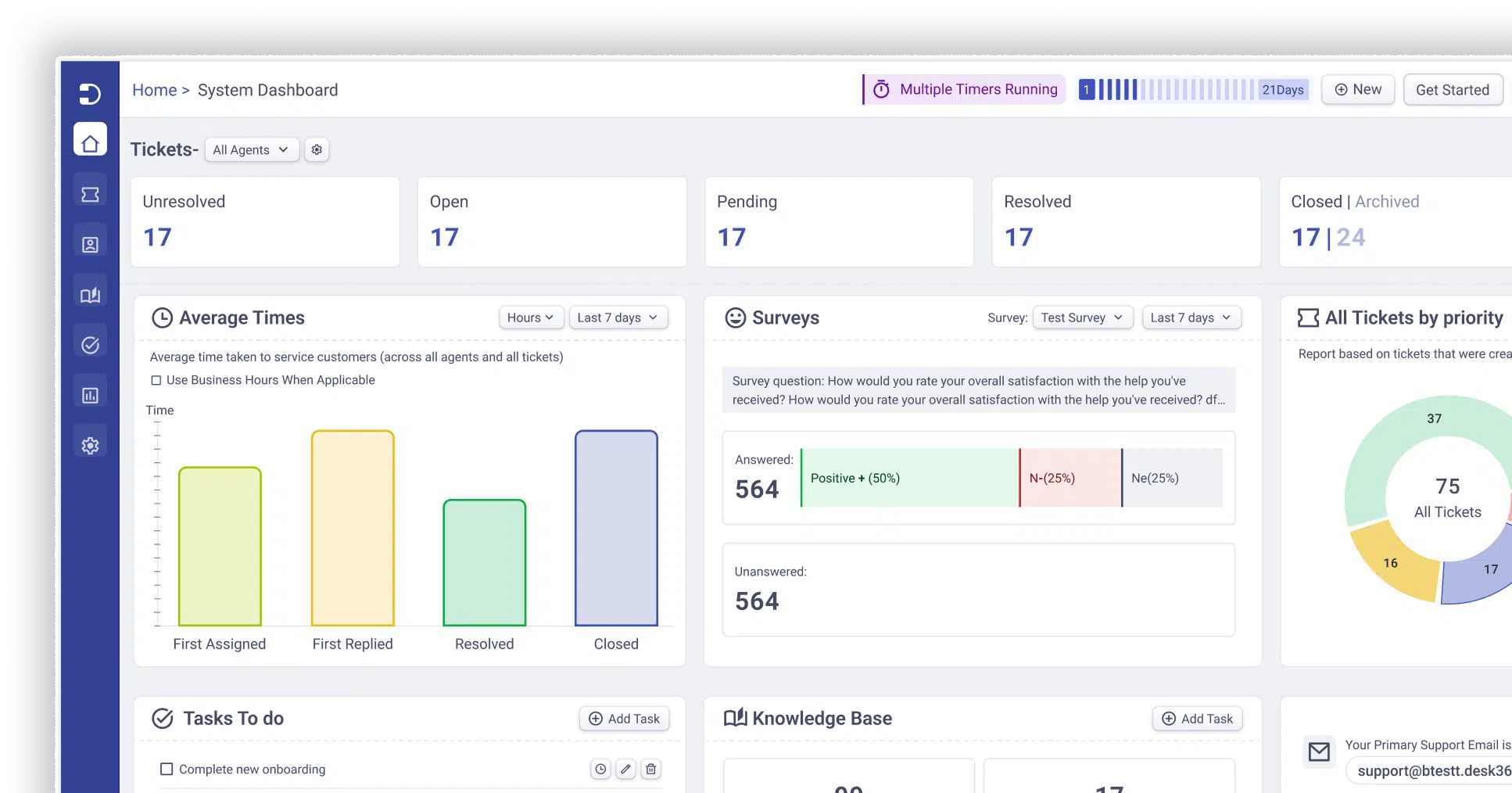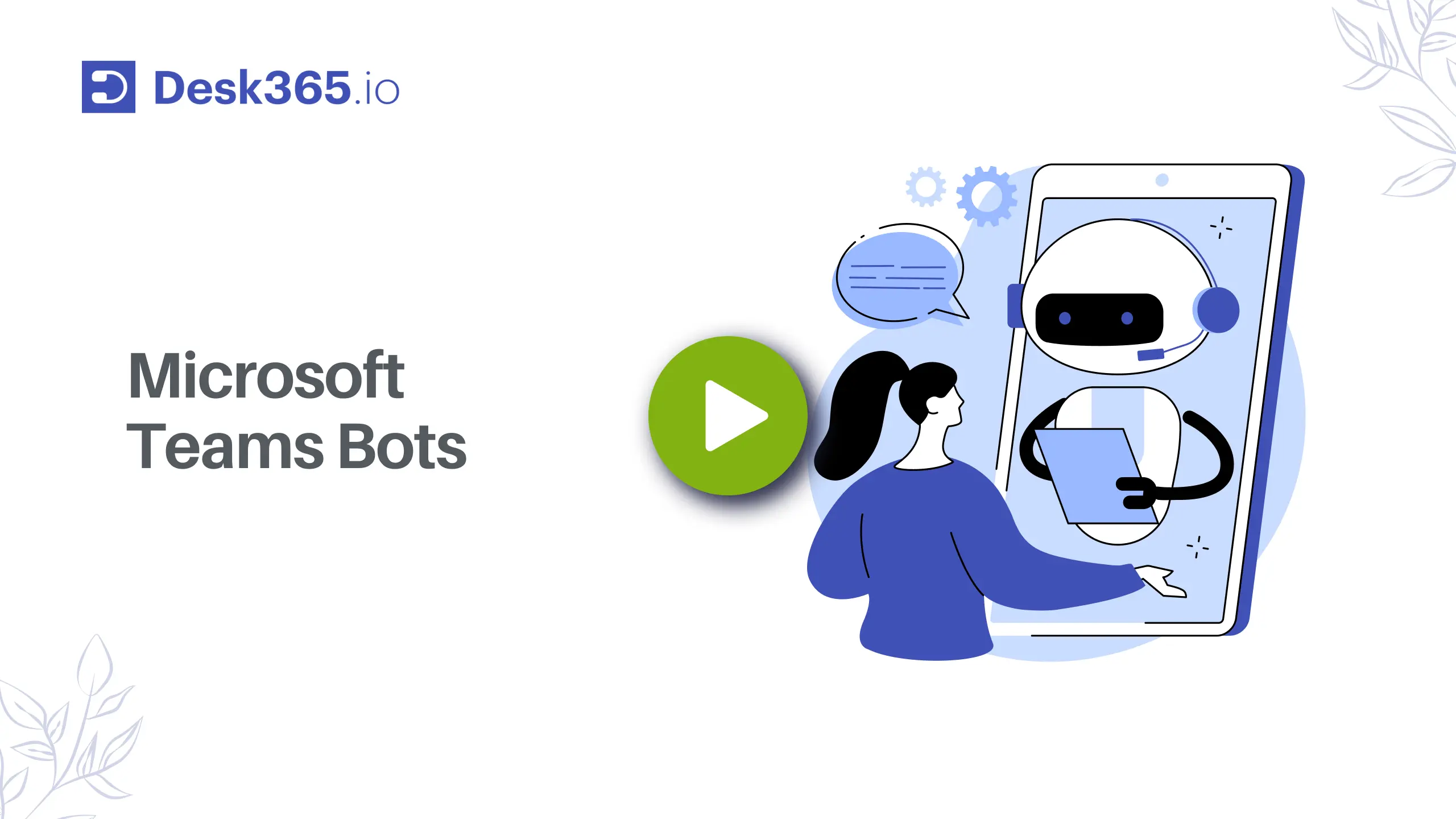In today’s fast-paced business environment, effective communication among team members is crucial for achieving success. Traditional email inboxes often lead to confusion, missed messages, and a lack of transparency. However, with the advent of shared inbox tools, teams can streamline their communication, enhance collaboration, and boost productivity.
Shared inbox software is becoming increasingly popular in the workplace, as more teams are collaborating remotely. A shared inbox allows multiple team members to access and manage emails from a single email address. This can help streamline communication and ensure that important emails are not missed.
There are many shared inbox tools available on the market, each with their own unique features and benefits. Some tools offer additional features, such as SLA management or knowledge base creation, while others focus solely on email management. Ultimately, the best shared inbox tool will depend on the specific needs and size of the team.
In this article, we will delve into the world of shared inbox tools, exploring their benefits, features, and the top options available in the market.
What is a shared inbox?
A shared inbox is an email inbox that multiple team members can access and work on simultaneously. Each team member has their own personal account, but they can send, read, and handle messages from specific shared mailboxes.
With a shared inbox, team members can easily see which emails have been read, which require a response, and which have already been handled. These tools allow teams to collaborate, assign tasks, and improve customer service response time. This allows for more efficient communication and helps ensure that no emails fall through the cracks.
Shared inbox tools can integrate emails, social media messages, customer support queries, and more, providing a centralized hub for managing conversations. Shared inboxes are commonly used for customer support, sales, and other team-based tasks that require collaboration.
In summary, a shared inbox, also known as a team inbox, is a powerful tool for teams that need to work together on email communications. By providing a centralized location for all messages and allowing for easy collaboration, shared inboxes can help teams work more efficiently and provide good customer service.
Recommended read – 15 Best Customer Service Software for Small Businesses in 2025
The best shared inbox tools to use in 2025
Shared inbox platforms are becoming increasingly popular among teams as they help manage team email more efficiently. In this section, we will discuss some of the best shared email inbox tools available in the market.
1. Desk365
Desk365 is a cloud-based shared inbox software that aims to simplify workflows and streamline customer support. It offers a wide range of functionalities to enable efficient customer service management, effective team collaboration, ticket routing, workflow automation, and adherence to service level agreements (SLAs).
Let’s take a look at Desk365’s shared inbox software features in detail below:
Group email management
Group email management is a core functionality of Desk365’s shared inbox software. It allows teams to efficiently handle custom support email addresses like support@example.com and sales@example.com. With group email management, teams can assign emails to specific team members, track email status, and ensure that all emails are responded to in a timely manner.
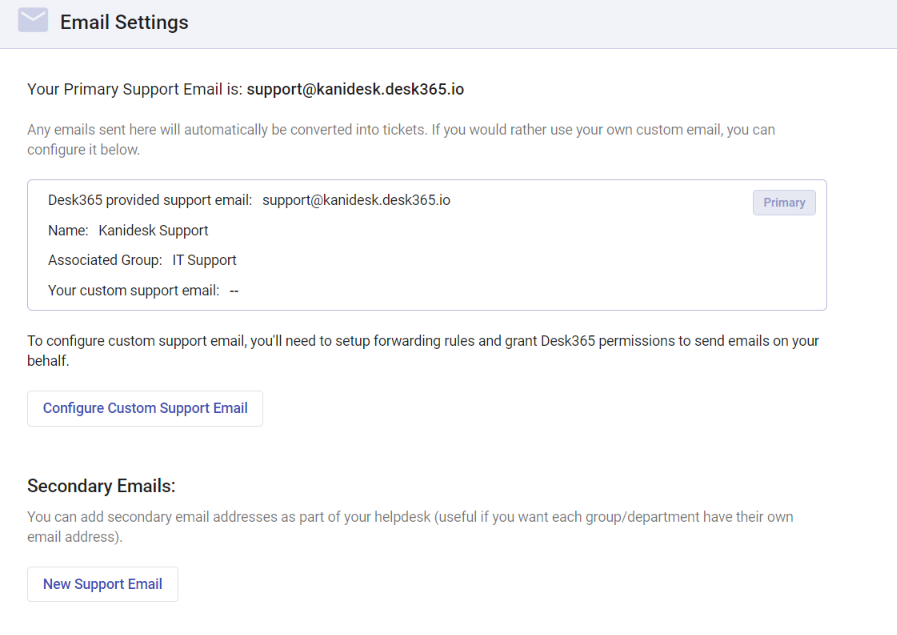
Internal discussions
Shared inbox software such as Desk365 also includes an internal discussion feature that allows team members to collaborate on tickets. Team members can leave internal notes on emails, ask questions, and provide feedback. This feature ensures that all team members are on the same page and that important information is not missed.
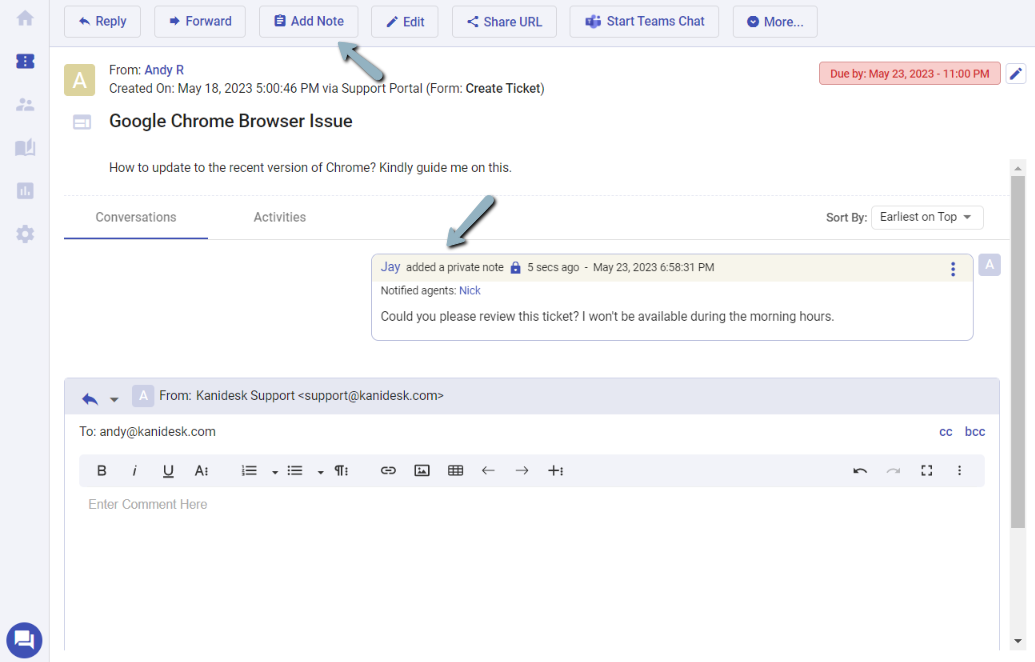
Automated emails
Automated emails are another feature of shared inbox software. Teams can set up canned responses in Desk365 to common email enquiries, such as password resets or order confirmations. This feature saves time and ensures that customers receive a prompt response.
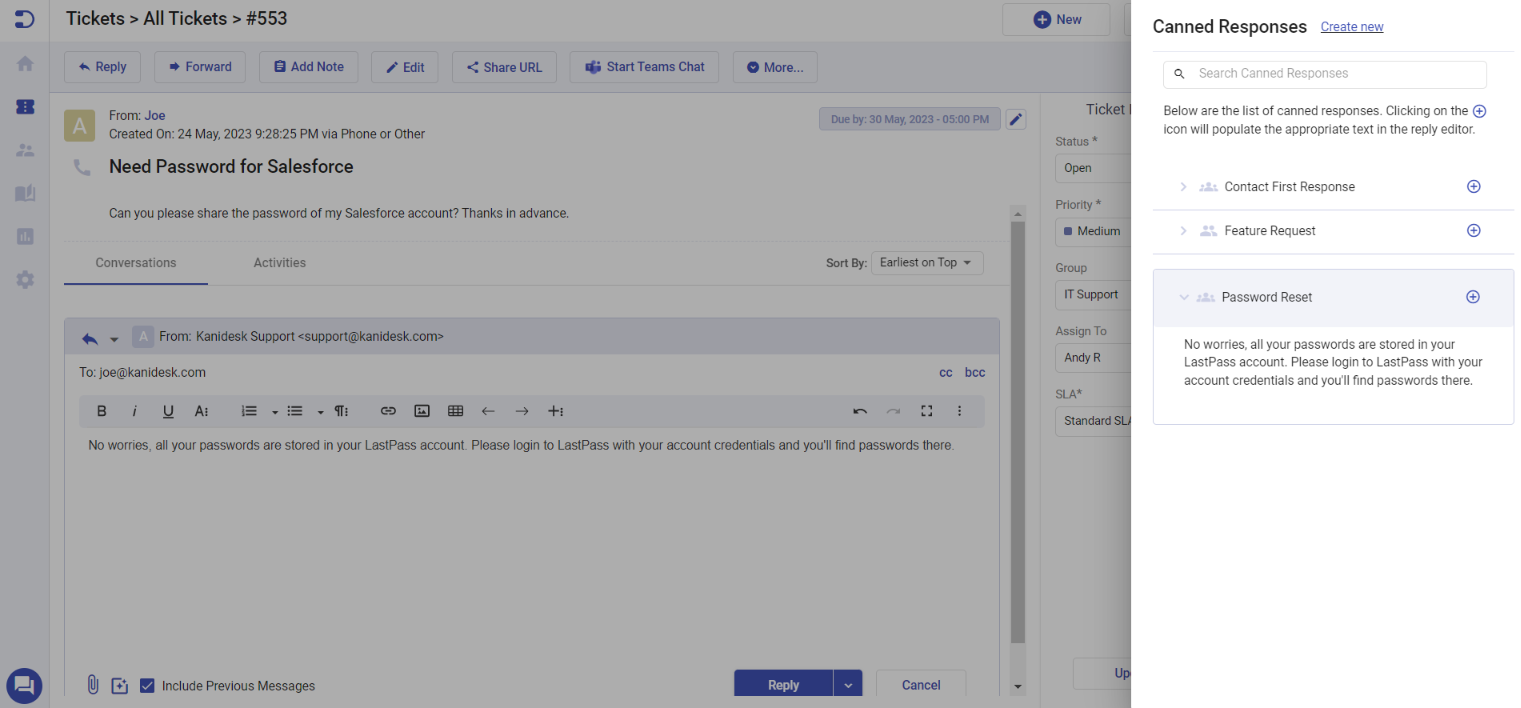
Automation and workflow management
Automation is a key feature of shared inbox tools, enabling teams to automate repetitive tasks and streamline workflows. Helpdesk automation is particularly powerful in Desk365, where teams can configure automation rules to automate email routing, message categorization, and predefined responses. By automating routine processes, teams can focus on more value-added activities, improving productivity and efficiency.
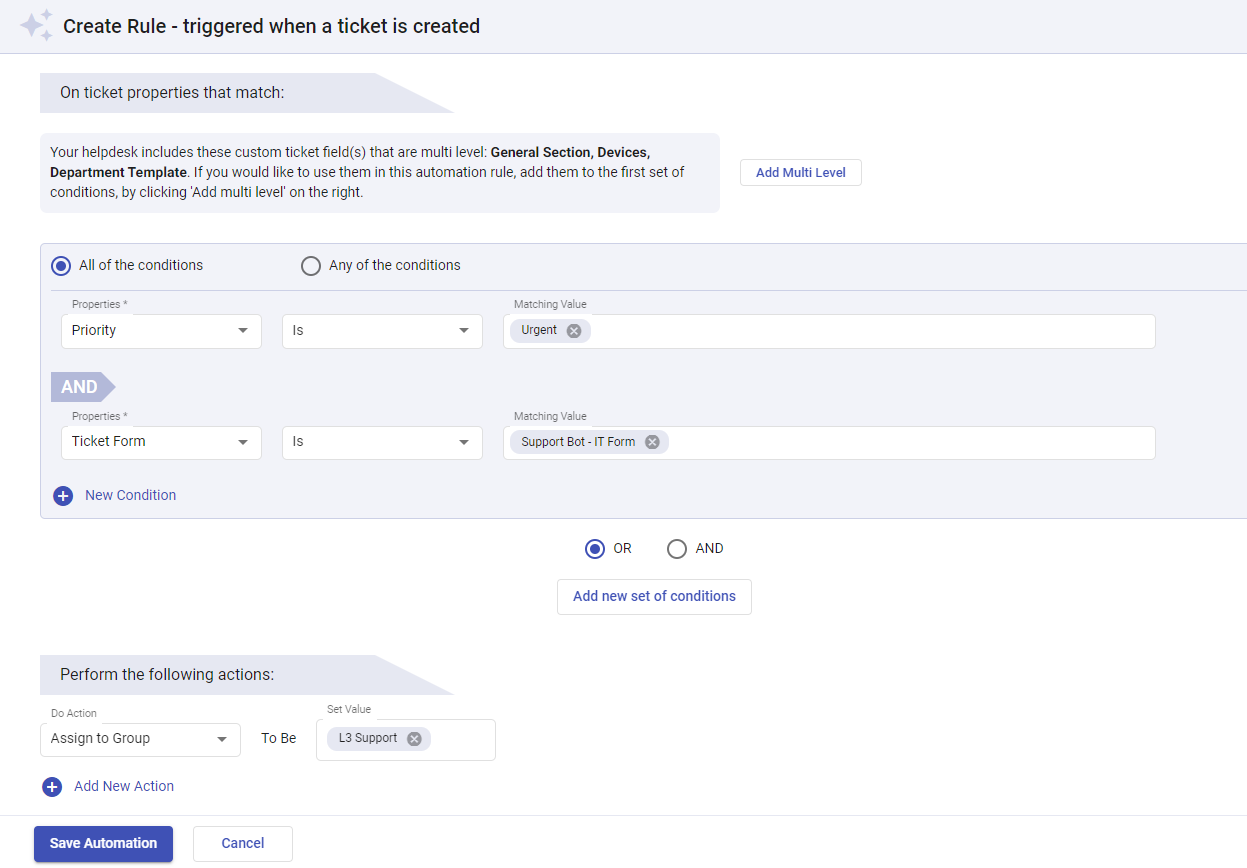
Collision detection
Collision detection is another important feature of Desk365. It prevents multiple team members from responding to the same email, ensuring that the team is not duplicating efforts. When an email is assigned to a team member, the software automatically detects if another team member is already working on the same email.
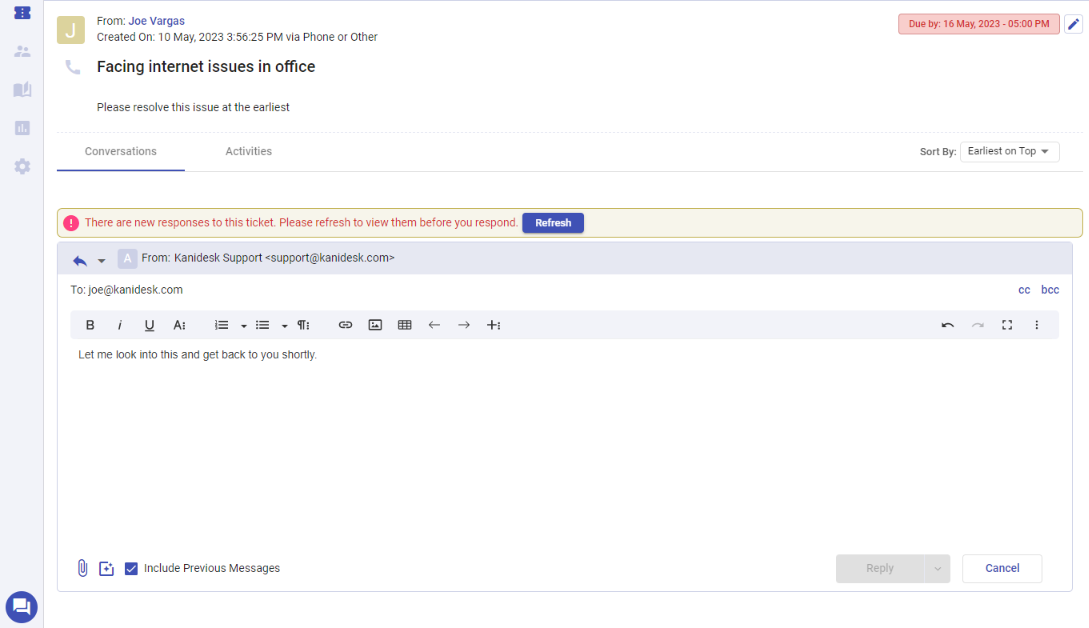
Reports and analytics
Desk365’s shared inbox software also includes reporting and analytics features. Support teams can track metrics such as email response time, volume, and customer satisfaction. This data helps teams identify areas for improvement and make data-driven decisions.
In summary, Desk365’s email ticketing software is packed with features that help teams manage their email communication effectively. From group email management to reporting and analytics, these features ensure that teams are working collaboratively and efficiently.
Recommended for teams who are looking for a robust shared inbox software with a comprehensive set of advanced and essential features
Price: 21-Day Free trial available. Paid Plans start at $12/agent per month.
Boost team efficiency with a shared inbox today!
2. HubSpot Service Hub
HubSpot Service Hub is a popular shared inbox software that helps teams manage customer enquiries and support tickets. It integrates with Gmail, Office 365, and other email clients, making it easy to manage all customer communication in one place. HubSpot Service Hub also comes with a powerful CRM that helps teams manage customer data and track customer interactions.
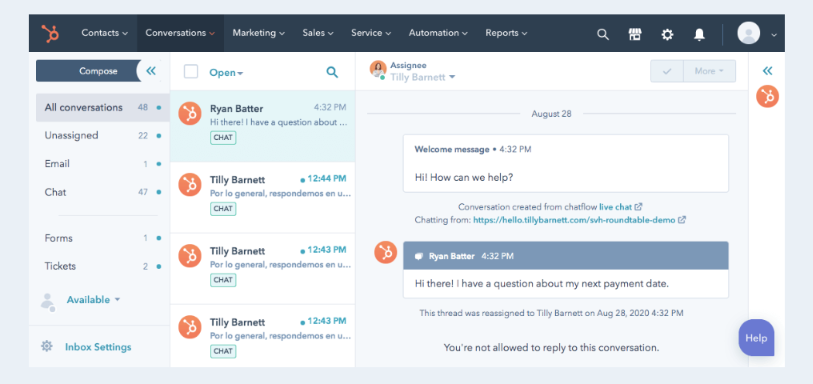
Recommended for teams already using HubSpot looking for basic shared inbox functionality.
Price: Paid Plans start at $50/month.
3. Kayako
Kayako offers a robust shared team inbox that empowers teams to provide exceptional customer support. Its intuitive interface and advanced features enable teams to manage customer requests, assign tickets, and collaborate seamlessly. Additionally, Kayako offers automation workflows, real-time reporting, and integrations with popular apps like Slack and Salesforce, making it a versatile tool for teams of all sizes.
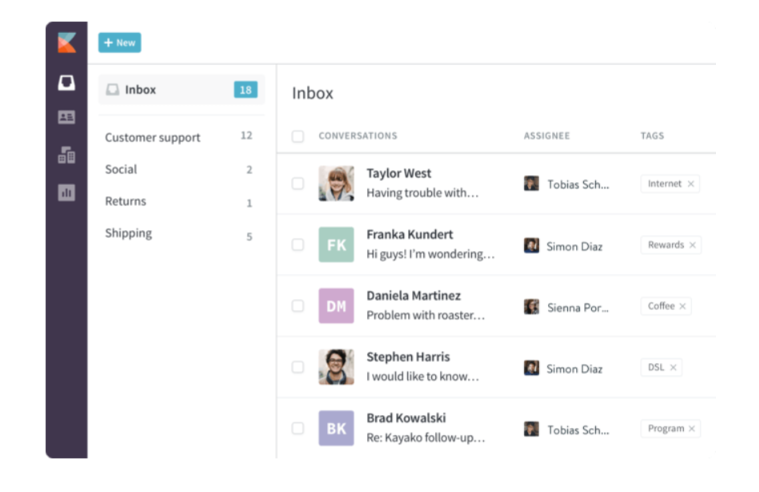
Recommended for teams requiring a comprehensive shared inbox tool with robust customer support features.
Price: Contact the company for a quote.
4. Front
Front is a popular team email management software that is designed for teams that receive a high volume of emails. It comes with a powerful inbox that allows teams to manage emails efficiently. One of Front’s notable features is its ability to centralize group emails, individual emails, SMS texts, live chat, and more into one place, providing teams with a complete view of customer interactions across all channels.

Recommended for teams seeking an all-in-one shared inbox solution with integrated team collaboration and automation.
Price: Paid Plans start at $19/seat per month.
5. Missive
Missive is a shared inbox tool that combines email, chat, and tasks into a single collaborative platform. The team inbox feature ensures that all team members have access to incoming messages, allowing for efficient communication and streamlined workflow. Missive also integrates with popular tools like Trello and Asana, enabling seamless task management and workflow integration.
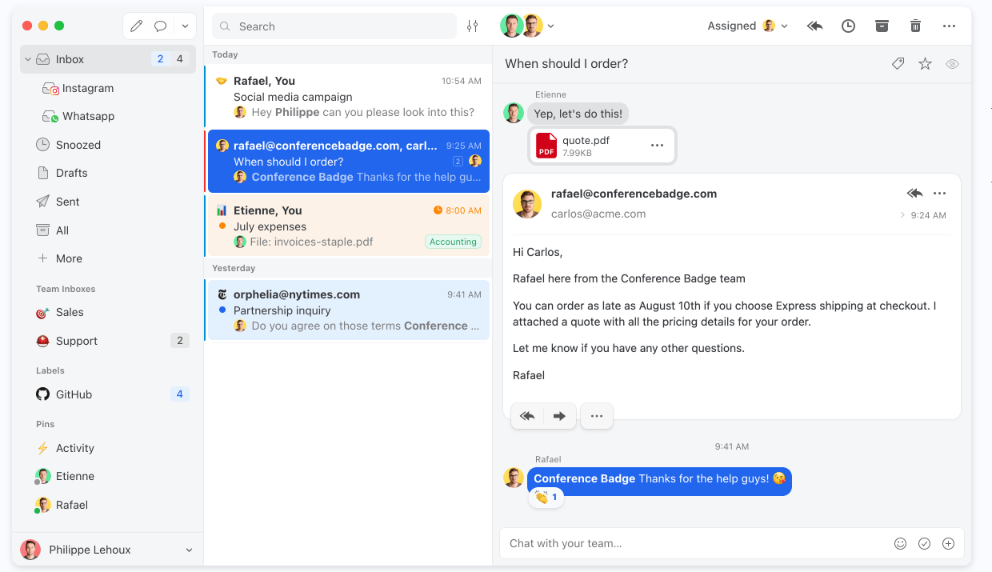
Recommended for teams that need a shared inbox with integrated chat and task management features.
Price: Paid plans start at $14/user per month.
6. Hiver
Hiver is a shared inbox tool built specifically for teams using Gmail. It simplifies email collaboration by enabling shared access to email accounts, allowing team members to assign and track emails, add notes, and collaborate on shared inboxes in real-time. Hiver also offers analytics and reports to gain insights into team performance and customer satisfaction.
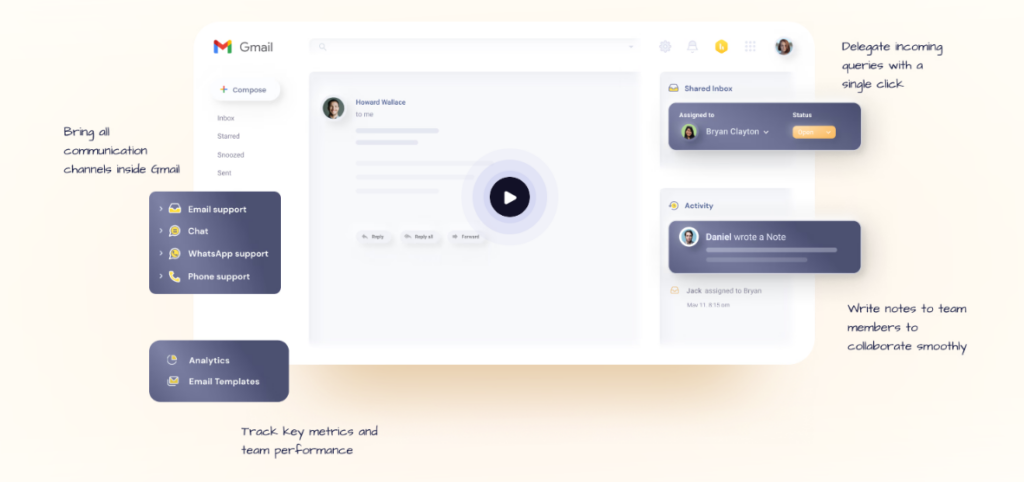
Recommended for teams that use Gmail and need a shared inbox with advanced collaboration features.
Price: Paid Plans start at $15/user per month.
7. Helprace
Helprace is a versatile shared inbox tool that combines ticketing, knowledge base, and community forums into a unified platform. With Helprace, teams can manage customer support enquiries, create a self-service knowledge base, and foster an engaged community for users to share insights and ideas.
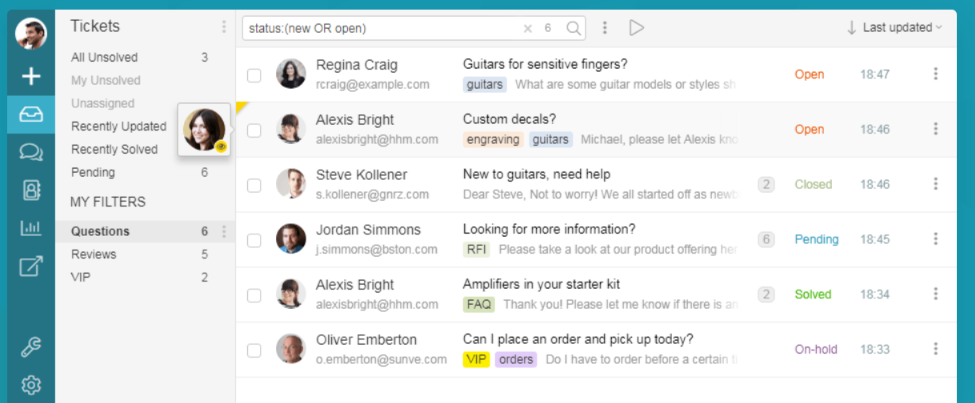
Recommended for teams that need a comprehensive customer service platform with shared inbox functionality and knowledge base management.
Price: Paid Plans start at $9/agent per month.
8. Google Collaborative Inbox
Google Collaborative Inbox is a shared inbox tool that sits on top of Gmail and allows teams to manage customer conversations from a single inbox. With Google Collaborative Inbox, teams can assign conversations to specific team members, leave internal notes, and collaborate in real-time. Plus, Collaborative Inbox integrates seamlessly with other Google Workspace apps like Google Docs and Google Calendar, allowing for even greater collaboration and productivity.
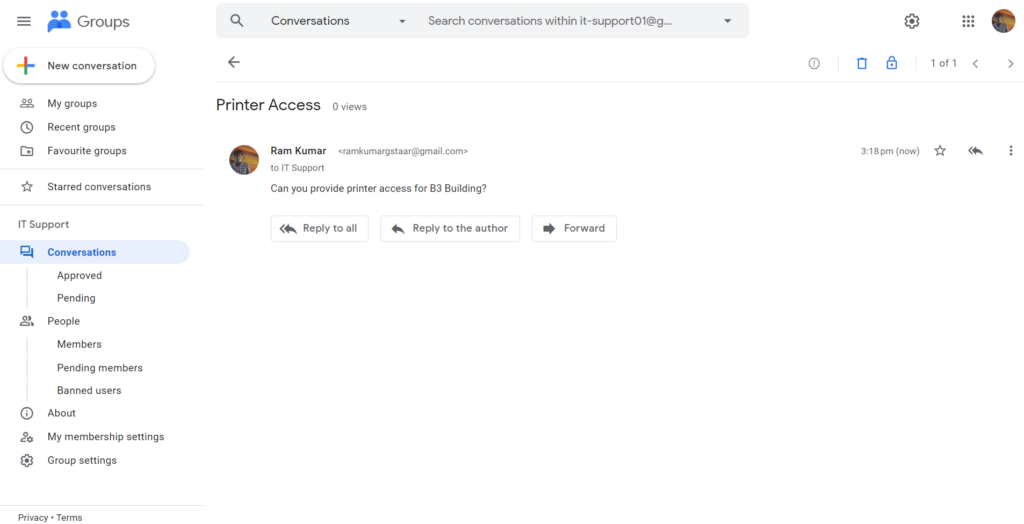
Recommended for teams that use Google Workspace and need a simple shared inbox solution.
Price: Free for Google Workspace users.
9. Outlook Shared Mailbox
Outlook Shared Mailbox is a shared inbox tool specifically designed for organizations using Microsoft Outlook. It enables teams to access and manage a shared email account, ensuring that multiple users can collaborate on incoming messages, reply to inquiries, and stay organized. With its integration with Outlook’s powerful features, such as calendar sharing and task management, Outlook Shared Mailbox streamlines communication and enhances productivity within the Outlook environment.
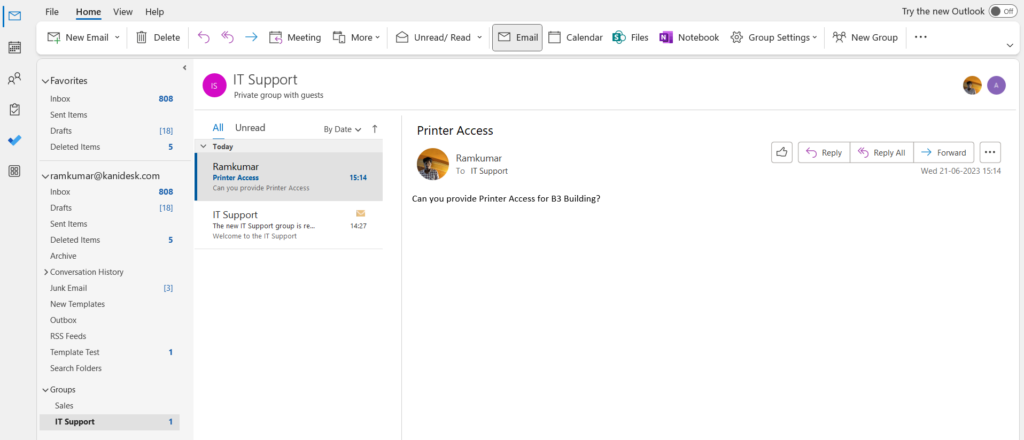
Recommended for teams using Microsoft Outlook, enabling multiple users to access and handle emails from a shared mailbox.
Price: Free for Microsoft 365 users.
10. Helpwise
Helpwise is a shared inbox tool that focuses on team collaboration and customer support. With its unified inbox, shared labels, and collision detection, Helpwise enables teams to manage multiple email accounts seamlessly. Additionally, it offers features like email templates, automation, and analytics, empowering businesses to provide efficient customer support while optimizing workflows and maintaining a high level of productivity.
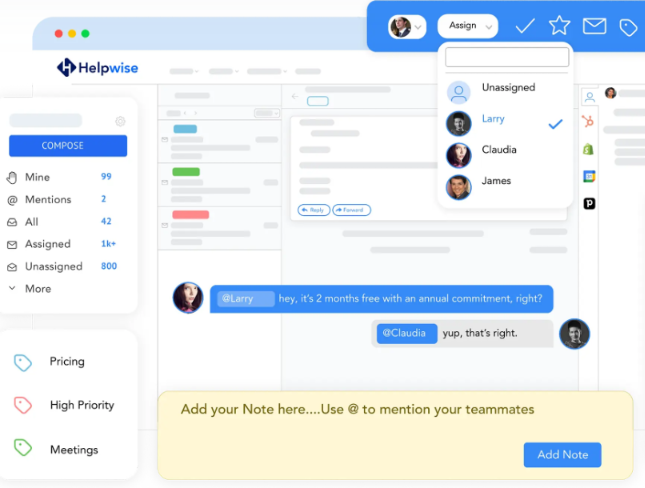
Recommended for teams seeking shared inbox functionality with advanced automation features and integration options.
Price: Paid Plans start at $12/user per month.
11. HappyFox
HappyFox is a comprehensive shared inbox tool that caters to customer support needs. It combines ticketing, live chat, and knowledge base functionalities into a single platform. With its automation capabilities, SLA management, and powerful reporting, HappyFox helps teams streamline customer support operations, improve response times, and deliver exceptional service.
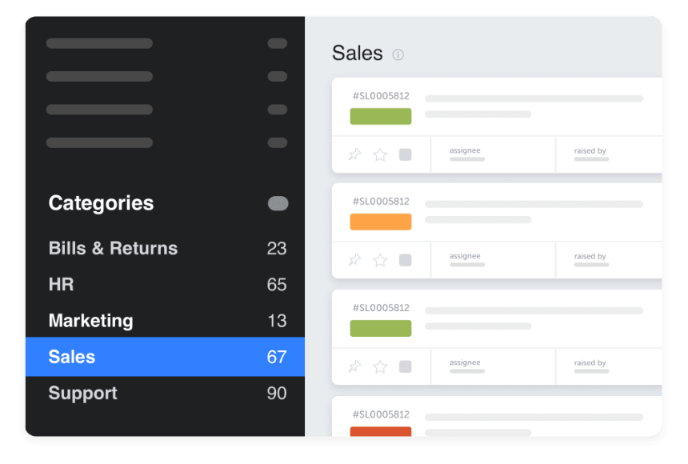
Recommended for businesses that need a comprehensive customer service platform with shared inbox functionality and ticket management.
Price: Paid Plans start at $29/agent per month.
12. Gmelius
Gmelius is a shared inbox tool that enhances team collaboration within Gmail. It offers shared email inboxes, shared labels, and shared notes, ensuring that team members can collaborate seamlessly on email threads. With additional features like email templates, email tracking, and email sequences, Gmelius empowers teams to work more efficiently and effectively.
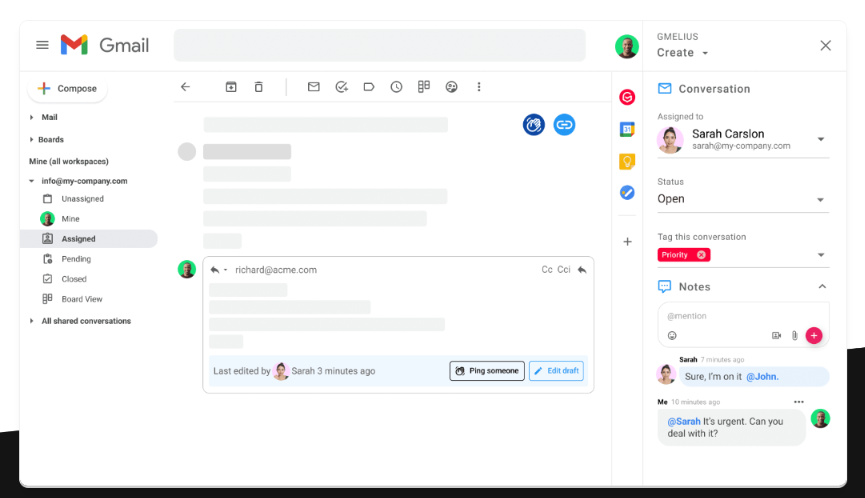
Recommended for teams that use Gmail and need a shared inbox with advanced collaboration and automation features.
Price: Paid Plans start at $15/10 users per month.
13. Drag
Drag is a unique shared inbox tool that transforms Gmail into a Kanban-style workspace. It allows teams to manage their emails using drag-and-drop boards, providing a visual and intuitive way to organize and prioritize tasks. With shared boards, internal team chat, and task assignment features, Drag facilitates seamless collaboration and boosts productivity for Gmail users.
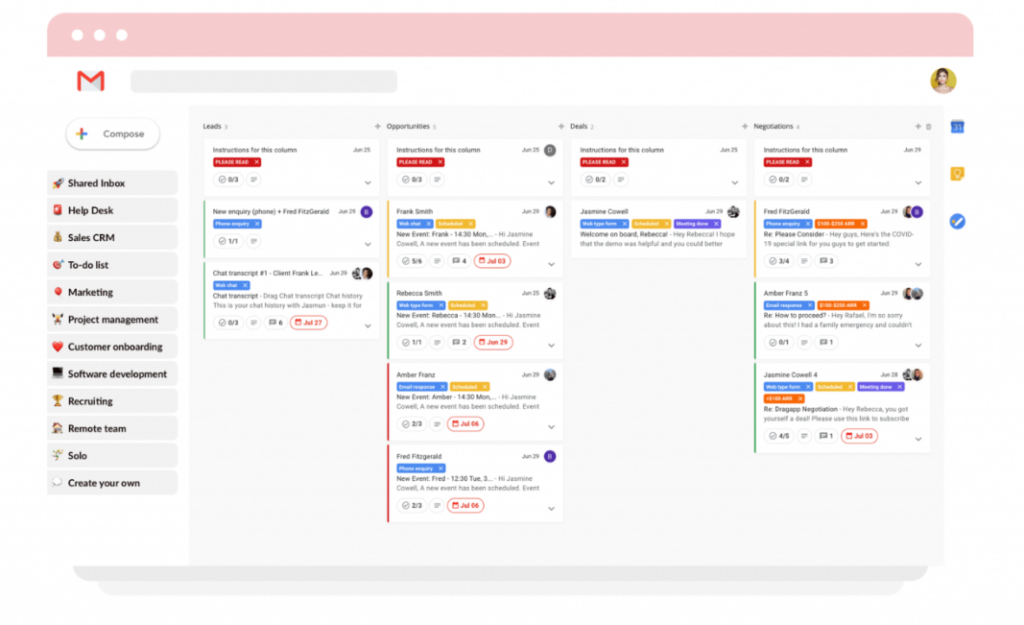
Recommended for teams that need a shared inbox with a visual Kanban-style interface and task management features.
Price: Paid plans start at $8/user per month
14. Groove
Groove is a shared inbox tool built specifically for customer support teams. It offers a unified inbox, ticket management, and customer engagement features to help teams deliver exceptional support experiences. With its collaboration features, knowledge base integration, and comprehensive reporting, Groove streamlines customer support workflows and enables teams to provide personalized and timely assistance.
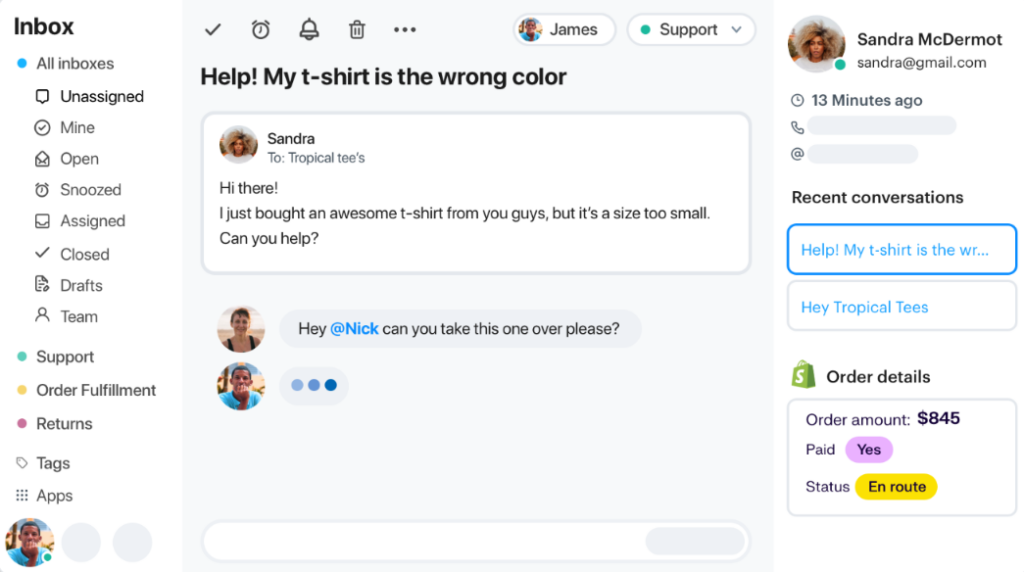
Recommended for startups and small teams needing a shared inbox with customer support features and helpdesk ticketing system.
Price: Paid Plans start at $12/seat per month.
Benefits of using shared inbox tools
Shared inbox tools have become increasingly popular among businesses as they offer a range of benefits that can enhance team productivity, collaboration, and communication. Here are some of the key benefits of using shared inbox tools:
Improved collaboration
Shared inbox tools facilitate seamless collaboration among team members. By centralizing communication, shared inboxes allow multiple team members to access and respond to emails, which means that everyone is on the same page and can work together to resolve customer queries and issues. This can also help to avoid duplication of effort and ensure that everyone is aware of the status of each email.
Efficient workflow management
Shared inbox tools can also help to streamline workflow management and increase efficiency. With a shared inbox, team members can easily delegate tasks and responsibilities, assign emails to specific team members, and track the progress of each email. This can help to ensure that emails are responded to promptly and that nothing falls through the cracks.
Real-time monitoring
Shared inbox tools also offer real-time monitoring capabilities, which can be useful for businesses that need to respond to customer queries quickly. With real-time monitoring, team members can receive notifications when new emails arrive, allowing them to respond quickly and efficiently. This can help to improve customer satisfaction and ensure that no emails are left unanswered.
Centralized knowledge sharing
Shared inbox tools allow team members to share information, collaborate on responses, and maintain a centralized knowledge base. This knowledge sharing helps ensure consistent messaging and empowers team members to learn from each other’s expertise.
In summary, shared inbox tools offer a range of benefits that can enhance team productivity, collaboration, and communication. By improving collaboration, streamlining workflow management, and offering real-time monitoring capabilities, shared inbox tools can help businesses to improve their customer service and boost their bottom line.
Factors to consider when choosing a shared inbox software
When choosing a shared inbox tool, there are several factors to consider. In this section, we will discuss some of the critical factors to keep in mind.
Integration with other tools
One of the key factors to consider when choosing a shared inbox tool is how well it integrates with your existing communication systems and platforms. For example, if your team uses a project management tool like Trello or Asana, you’ll want to make sure your shared inbox tool can integrate with it seamlessly. This will help streamline your workflow and reduce the amount of time your team spends switching between different tools.
Pricing
Another important factor to consider is pricing. While some shared inbox tools are free, others can be quite expensive. It’s important to find a tool that fits within your budget while still providing the features and functionality you need. Some tools offer different pricing tiers depending on the number of users or the features you need, so be sure to compare different options and choose the one that best fits your needs and budget.
User interface
The user interface of a shared inbox tool is also an important consideration. You’ll want to choose a tool that is easy to use and navigate, with a clean and intuitive interface. A clean and organized interface contributes to a positive user experience and helps maximize productivity. The tool should require minimal training for team members to start using it effectively.
Customization options
Every team has unique communication requirements. Look for a shared inbox tool that offers customization options to adapt to your team’s specific needs. Customizable features, such as message tagging, filters, and notifications, allow teams to tailor the tool to their preferred workflow and organization structure.
Security and data privacy
Communication tools handle sensitive and confidential information. Ensure that the shared inbox tool prioritizes security and data privacy. Look for features like encryption, secure user authentication, and data backup to protect your team’s communication and maintain the confidentiality of your messages.
Customer support
Finally, customer support is an important consideration when choosing a shared inbox tool. Look for a tool that offers robust customer support options, including email support, phone support, and live chat. You’ll also want to consider the quality of the support – do they respond quickly to enquiries, and are they knowledgeable and helpful? Good customer support can make a big difference when you’re trying to get up and running with a new tool, or when you run into issues or have questions down the line.
By carefully evaluating your options and choosing a software that meets your needs in these areas, you can ensure your team stays organized, productive, and efficient.
Enhancing team communication with a shared inbox solution
Managing email can be a real challenge, especially when multiple team members need to access the same inbox. That’s where shared inbox tools come in, providing a centralized platform for handling customer inquiries, support tickets, and other messages.
With features like collision detection, email assignment, analytics & reporting, a shared inbox software like Desk365 can help streamline your customer service team’s email workflow, improve customer service response times, and improve collaboration among team members.
Frequently asked questions (FAQs)
Shared inbox software allows multiple team members to access and manage emails from a single inbox. This is ideal for handling team-based communication channels, like support or sales inboxes, enabling collaboration and improving response times.
The best way to manage a shared mailbox is to use shared inbox software with features like email assignment, internal notes, collision detection, and automation. This setup helps streamline workflows, prevent duplicate responses, and maintain organized communication.
Shared inbox software improves team collaboration, streamlines workflows, centralizes communication, provides real-time monitoring, and enhances customer support efficiency.
Yes, most shared inbox tools integrate with CRM systems, project management platforms, and other productivity apps like Slack, Trello, or Asana, enabling teams to manage their workflow more efficiently without switching between tools.
Key factors include integration with existing tools, ease of use, customization options, data security, and pricing.


